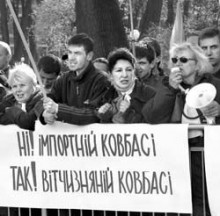After his visit to Europe, Ukraine’s State Customs Service Chief Volodymyr Skomarovsky decided to extend both hands to big Ukrainian and international business. At least this is what he said during his meeting with the European Business Association, a civic organization uniting over 100 major companies.
According to EBA board member Timo Hammaren, customs issues are uppermost in the minds of businessmen whose representatives are looking to Mr. Skomarovsky as their only hope.
The Customs Service chief is proud to have been accorded this trust and says that changes to the customs policy will factor in the opinions of business people, because “customs officials tend to see things only from their own perspective.” The first major change will be the introduction as of May 1 of a one-stop customs clearance procedure. To discourage the 18,000-strong army of customs officers from abusing their official positions for personal enrichment, the Customs Service is launching a hotline for disgruntled customers.
In addition, the Customs Service plans to poll individuals who have just been cleared through customs to find out if they have any complaints. As the chairman put it, “We want you to leave customs smiling.” Keeping business people happy will not be the task of customs officers alone. Their ranks will be bolstered by people with economic savvy, who have never served in the tax or customs services, which are notorious for their venal ways. All of this will help defend business interests, Skomarovsky says. In order to know exactly what the Customs Service should be defending, he has extended an invitation to the business community to meet regularly and share their problems and demands.
The first to be raised at the meeting was the problem of laboratories that inspect goods imported into Ukraine. According to Mykola Babiak, director of the Ukrainian branch of Dow AgroSciences, a company that sells pest control products, customs laboratories do not have the technology to determine the exact type of products his company is importing. It is Mr. Babiak’s belief that since his company has permits from every possible department, confirming that these are safe and legal products, customs should only check their documents and quantity. Mr. Skomarovsky could not provide a satisfactory answer and only said that a unified customs laboratory has been created to inspect all imported goods. He did not say, however, whether customs officers will be able to inspect individual kinds of goods more efficiently.
Inspections are a painful issue for the whole business community. The director of logistics for Adidas-Ukraine, Svitlana Lavrova, asked about the possibility that law-abiding companies with impeccable payment records will be exempt from constant and detailed inspections in the future. According to her, constant customs inspections that involve opening every container damage goods and the company then loses money. Nestle Ukraine’s corporate liaison manager Hennadiy Radchenko inquired about the steps that should be taken to avoid humiliating searches. Serhiy Siomka, director of the Customs Inspection Department, answered this question by saying that his service is now compiling a white list of companies with a good customs record. His department will proceed to relax the criteria for companies that want to be included in this list. For example, minor technical violations of customs laws will not qualify the company as a repeat offender. However, compiling this list is a slow process: out of 37,000 importers, only 40 can cross the border without too much trouble.
The business community is also concerned about the legal requirements for reclassifying imported goods and providing markings in the Ukrainian language. Skomarovsky assured those present that he would look into this matter and eliminate the reclassification requirement altogether, with authorization to provide markings on Ukrainian territory within a 15-day window.
Skomarovsky also promised that he will be urging parliament to decrease the high import duties for foodstuffs that are not produced in Ukraine. In his view, the duty on such goods should be minimal, while the import duty on foods that are also produced in Ukraine should be at least 30%. He also promised to get parliament to revise import duties for books and other types of goods.
Aside from making promises to “improve, expand, and intensify,” Skomarovsky had to answer accusations concerning the fact that the biggest hole in the Ukrainian border is the section between Ukraine and Transdnistria. According to one businessman, Moldova suspects Ukraine of turning a blind eye to contraband coming through this section of the border. In his defense, Skomarovsky said that all these problems stem from political differences between Moldova and Transdnistria. As he put it, the Ukrainian Customs Service does not intend to kowtow to Moldova by unjustifiably blocking the passage of shipments from Transdnistria or by allowing the presence of Moldovan border guards on Ukrainian territory. Answering the accusations of negligence, Skomarovsky pointed out that the border with Moldova has 78 border crossings. If there is any smuggling, it is occurring only on a local scale.







